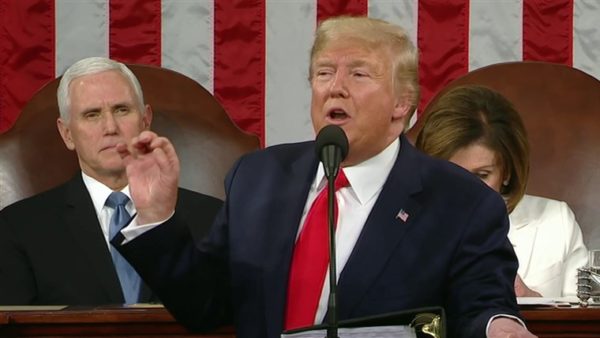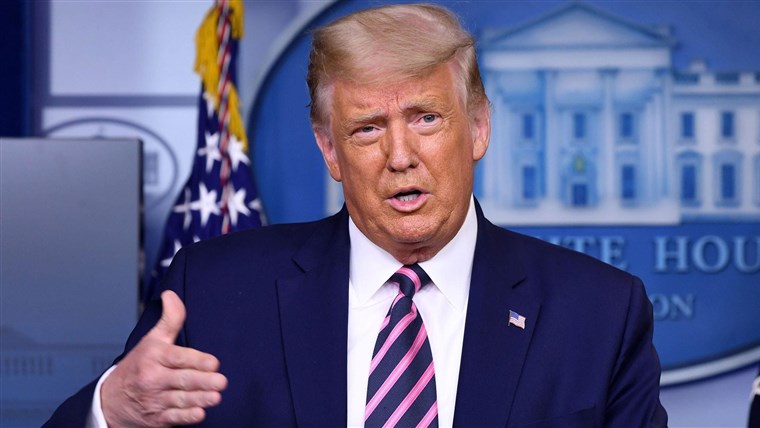Advertisement
White house memo
Previous presidents made an effort to make a distinction between the two and had their campaigns, not taxpayers, foot the bill for political events.

WASHINGTON — President Trump traveled on Air Force One to Florida one day last month to pitch an executive order aimed at improving private Medicare plans when he launched into a series of broadsides against some of his possible Democratic opponents.
“Elizabeth ‘Pocahontas’ Warren. You know, when I used to hit her, I thought she was gone,” he said to a crowded ballroom of elderly voters. But Ms. Warren “came up from the ashes.” As for former Vice President Joseph R. Biden Jr., he said, he couldn’t “see Sleepy Joe making it, I’ll tell you.”
Past presidents sought to maintain at least an appearance of a separation between official and political business.
But Mr. Trump has not just blurred the lines between the two. He has turned presidential speeches into political ones, and official trips around the country into campaign opportunities, complete with taunts of his rivals, riffs about his enemies, pleas for votes and fear-mongering about what will happen if he loses.
On Friday, Mr. Trump traveled to Atlanta for an overtly political event: he delivered remarks at the Black Voices for Trump Coalition Rollout, and the campaign paid for his travel. But there have been many other events that were not designated as campaign events, but may as well have been. And for many voters, that’s part of his appeal.
“He knows there’s a core that adore him, but also a sizable number of people that want to see Washington disrupted,” said Jonathan Turley, a law professor at George Washington University. “This merging of the political with the official works with that narrative.”
In the past, presidents went out of their way to ensure their official remarks did not veer into political territory. Copies of speeches were meticulously edited by the White House Counsel’s Office, which would flag lines that could violate the Hatch Act, a Depression-era law that prohibits federal employees from engaging in political activities while on the job.
The president is not subject to the Hatch Act but everyone who works for him is. Speechwriters and policy advisers who helped prepare those remarks, for instance, could be in violation of the act if they were crafting an overtly political speech for the president. But the Hatch Act is ultimately self-enforcing, and toothless if the president chooses to ignore warnings from White House lawyers about possible violations.
President Barack Obama’s aides said they took the law seriously.
“The reason we were so cautious about it was the fear the campaign would then have to pick up the tab for the event,” said Dan Pfeiffer, a former communications director for Mr. Obama. “The Air Force One travel, the cost of the venue — that’s a huge bill to pick up for a stray sentence.”
The Government Accountability Office, an independent investigative arm of Congress, and groups like Judicial Watch have estimated the hourly rate for flying Air Force One to be anywhere from $142,000 to $272,000.
In a January report, the Government Accountability Office estimated that four trips Mr. Trump took from Washington to his Mar-a-Lago Club in Palm Beach, Fla. over a one-month period in early 2017 cost federal agencies about $13.6 million. The Defense Department and the Department of Homeland Security incurred most of those costs, which were covered by taxpayers just as Mr. Obama’s annual personal trips to Hawaii or Martha’s Vineyard, Mass., were.
Presidents have often tried to defray the travel costs by tacking on an official event on the way to a campaign rally, and passing the bill onto the government. What they did not do was effectively turn an official event into a campaign rally.
In the past, Mr. Trump himself has complained about taxpayers shouldering the cost of flying Air Force One when it was used for political purposes.
“Taxpayers are paying a fortune for the use of Air Force One on the campaign trail by President Obama and Crooked Hillary,” he wrote on Twitter on July 5, 2016. “A total disgrace!”
But a Trump campaign spokesman said the campaign has never been asked to reimburse the federal government for official travel that turned into an overtly political event.
Speaking in Pittsburgh last month at an energy conference, Mr. Trump warned the crowd in the critical swing state of what would happen if a Democrat replaced him. “Our vision is the exact opposite of what they want to do,” he said. “Many politicians in our country are targeting your industry and your jobs for, literal, total destruction.”
It was an official White House event, but Mr. Trump lapsed into part of his standard rally banter, discussing his shift to a new campaign slogan. “We were calling it, ‘Make America Great Again,’” he said. “We’re calling it now ‘Keep America Great.’ We will keep it going.”
A week later, as he addressed an audience at a historically black college in South Carolina, Mr. Trump launched into one of the staples of his rally riffs: ridiculing Lisa Page and Peter Strzok, two former F.B.I. agents involved in the Russia investigation, whom he refers to at rallies as the “two great lovers” who were secretly conspiring to stop his election. The aside had little to do with the ostensible purpose of the event: criminal justice reform.
And at the Values Voters Summit in October, Mr. Trump attacked Representative Adam B. Schiff, Democrat of California and the chairman of the House Intelligence Committee, as a “pencil neck. You would not be impressed with him physically. But he’s a crooked person.”
Mr. Trump has also made it clear he doesn’t think much of the laws in place designed to prevent politics from seeping into government work. After the Office of Special Counsel recommended that Mr. Trump fire Kellyanne Conway, one of his top White House aides, for repeated violations of the Hatch Act, Mr. Trump said he saw the situation differently and had no intention of seeing to it that his aide abided by the law.
“It looks to me like they’re trying to take away her right of free speech, and that’s just not fair,” he said in an interview on Fox News.
It wasn’t just Ms. Conway whose conduct he shrugged off — Ryan Zinke, the former interior secretary, Dan Scavino, a White House aide, and Stephanie Grisham, the White House press secretary, have all been found in violation of the Hatch Act, but not punished.
During Mr. Obama’s presidency, his housing secretary, Julián Castro, was also not punished for violating the Hatch Act by campaigning on government property. The rationale at the time was that Mr. Castro had acknowledged the “inadvertent error.”
A White House spokesman said all of Mr. Trump’s official remarks are reviewed by the White House Counsel’s Office, as they have been in previous administrations, and that his remarks, as written, are always in compliance with the Hatch Act.
But the spokesman, Judd Deere, conceded that Mr. Trump “may add to the prepared remarks during the event.” Any asides would not be subject to the law, he said.
Former Obama aides dismiss the distinction as a pretense. “Handing a sanitized speech to the authorities to sneak the goods through customs doesn’t mean you’re not sneaking the goods through customs,” said David Axelrod, a former top adviser.
Mr. Axelrod said that Mr. Trump’s line-blurring amounted to a kind of remittance to his re-election campaign. “It will over time give him an advantage,” said Mr. Axelrod. “He will be essentially subsidizing his campaign with public funds, just as he subsidizes his business with public funds.”
Ever since his 2016 campaign, efforts to get Mr. Trump to stick to his prepared remarks as they appear on his teleprompter have failed. Now the president is surrounded by a group of aides who largely aim to let Trump be Trump, rarely even trying to make him stick within the boundaries of an official address.
Speaking at Benedict College in South Carolina in October, an official presidential event in front of a handpicked audience of supporters, Mr. Trump belittled Mr. Obama’s record on racial equity and claimed he had done more than his predecessor to help African-Americans.
“Check out the last administration and see what they did for you,” Mr. Trump said, recalling with pride his message to black voters in 2016: “What the hell do you have to lose?”




